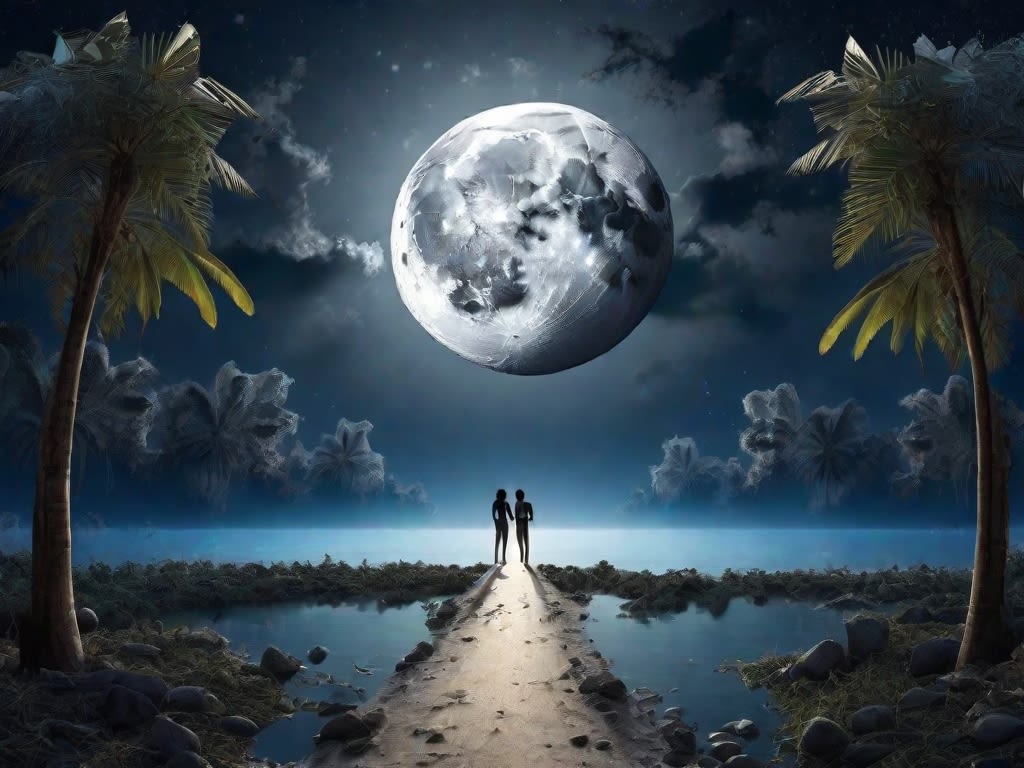Does The Full Moon Effect Human Behavior?
Unraveling the Enigma of the Full Moon's Influence on Human Behavior!

Throughout history, humanity has been fascinated by the celestial bodies that grace our night sky. The Moon, Earth's closest celestial neighbor, has long held a special place in our hearts and minds. The moon's mesmerizing glow has sparked countless myths, legends, and beliefs, many of which revolve around its mysterious ability to influence human behavior. From the idea that the full moon can drive people to madness to claims of increased criminal activity during certain lunar phases, the moon's sway over our lives has been a topic of intrigue for centuries. In this exploration, we will embark on a journey to uncover the truth behind these lunar legends, asking the question: Does the full moon truly affect human behavior?
The Ancient Beliefs
Our story begins in ancient times, where the moon's impact on human behavior was first postulated. The word "lunatic" finds its roots in the Latin word "lunaticus," which means "moonstruck" or "of the moon." This term reflects the long-held belief that certain phases of the moon, particularly the full moon, could lead to madness or erratic behavior.
Greek philosophers like Aristotle pondered the moon's influence on human life. They proposed that the human brain, which floats within the skull much like the tides of the open seas, might make our organs susceptible to the gravitational pull of the moon. This early connection between the moon and human physiology laid the foundation for centuries of speculation.
The Middle Ages saw the proliferation of myths surrounding the moon's power. It was a time when people widely believed in lycanthropy – the idea that some individuals were cursed to transform into werewolves during a full moon. These beliefs have managed to persist even into modern times.
People have consistently attributed strange occurrences and behaviors to the presence or absence of the moon. The full moon, in particular, has been blamed for accidents, flights of fancy, homicides, animal attacks, and a host of other unusual events. In 2007, the police force in certain regions of the United Kingdom took the moon's mystical powers so seriously that they assigned extra officers to patrol the streets during full moons, anticipating a surge in crime rates.
Cultural Variations
The belief in the moon's influence on human behavior is not limited to any one culture or region. It spans the globe, with countless societies attributing various effects to the moon's phases. From Asia to Africa, Europe to the Americas, the moon's sway over our lives has been a universal phenomenon. We can't help but wonder if there is a kernel of truth within this widespread myth.
Science's Quest for Answers
Intrigued by these long-standing beliefs, scientists have embarked on a quest to uncover the scientific truth behind the lunar effect. However, their findings have left us without a clear and definitive answer. Many experts assert that there is no proven correlation between the full moon and human actions. They attribute the belief to superstition and coincidence.
Theories and Investigations
Despite the lack of concrete evidence, some studies hint at a connection between the full moon and human behavior. One theory suggests that the moon's gravitational pull may influence water, which poses a potential avenue for impacting human physiology. Given that our bodies are primarily composed of water, it is believed that the moon's influence on water molecules in our brains and nervous systems could alter our dispositions. However, astronomers and physicists have countered this theory, arguing that the moon's gravitational pull is too weak to affect our brain function significantly.
In 1985, psychologists James Rotton and Ivan Kelly conducted a comprehensive meta-analysis of over 30 studies on the lunar effect. Their research, aptly titled "Much Ado About the Full Moon," concluded that there was no substantial link between the full moon and bizarre occurrences, such as crimes, suicides, and the surfacing of people's psychological issues. They even went so far as to suggest that further study on the lunar effect was no longer necessary, believing the matter to be settled.
However, this conclusion did not deter those who remained steadfast in their belief in the moon's influence. In 2013, a study surfaced that indicated people sleeping inside a laboratory reported a 15% reduction in sleep quality during the full moon, even when they couldn't perceive the moon's extra light. Although researchers did not attribute this to the moon's gravitational effect, they suggested that the lunar rhythm might play a role in the modulation of human sleep structure.
The Illusory Correlation
Psychologists Loren and Gene Caplan of the University of Wisconsin-Madison proposed a different perspective. They labeled the perceived connection between the full moon and human behavior as an "illusory correlation." This term suggests that people tend to perceive a phenomenon where there isn't one. We interpret events we witness based on our preconceptions, and if you believe in the lunar effect's validity, you are more likely to notice and remember unusual occurrences during a full moon.
Historical Explanations
Psychiatrist Tripler Orison of Emory University introduced a theory that the lunar effect may have been a valid phenomenon at some point in our distant past. In the absence of modern lighting, early humans relied on the moon's bright light to guide them at night. When individuals who suffered from mental disorders were deprived of sleep, their conditions could have worsened, leading to erratic and aggressive behavior. People witnessing these individuals during a full moon may have imagined a connection between their actions and the lunar phase, leading to the perpetuation of the myth.
The Media's Role
In our contemporary world, where science and logic are purportedly the governing principles, we still find ourselves captivated by the moon's mystical powers. Our fascination with the supernatural is perpetuated by a continuous stream of Hollywood horror movies that depict eerie occurrences against the backdrop of a full moon in the evening sky.
Conclusion
While science has yet to definitively establish a link between the moon and human behavior, the moon's enigmatic influence continues to capture our imagination. Whether real or imagined, the moon's impact on our lives remains an enduring mystery. It serves as a testament to the compelling allure of the unexplained in our logical world.
In conclusion, we share this world with a celestial companion whose influence on our lives, even if it remains a subject of speculation, cannot be denied. Our long-standing beliefs in the moon's mystical powers serve as a reminder of the enduring capacity of the human mind to embrace the unknown. In a world where science and logic reign, we find comfort in the moonlit tales that persist and spark our curiosity each time we gaze up at the night sky.
The question remains: Does the full moon affect human behavior? The answer continues to elude us, but perhaps that is where the charm lies – in the enigma of the moon's influence on our lives.
About the Creator
Sophia Hayes
💰 Crafting Life's Stories, Poems, Fascinating Facts and Intriguing health, wealth facts await! 🌟 – A Journey Through Elegance.📚✒️
Subscribe for daily insights.
#Finance #Stories #Poetry #funfacts #WellnessWisdom 💚






Comments (4)
Great article- I find that the moon does do strange things to people. Just weather in general can have an impact. Thanks again for sharing.
Hi we are featuring your excellent Story in our Community Adventure Thread in The Vocal Social Society on Facebook and would love for you to join us there
I don't know about the moon, but overcast and rainy weather affects me a lot.
Absolutely, the moon's influence on human behavior has fascinated cultures for ages. Its subtle impact often stirs curiosity and shapes intriguing discussions about its effects on our emotions and behaviors.